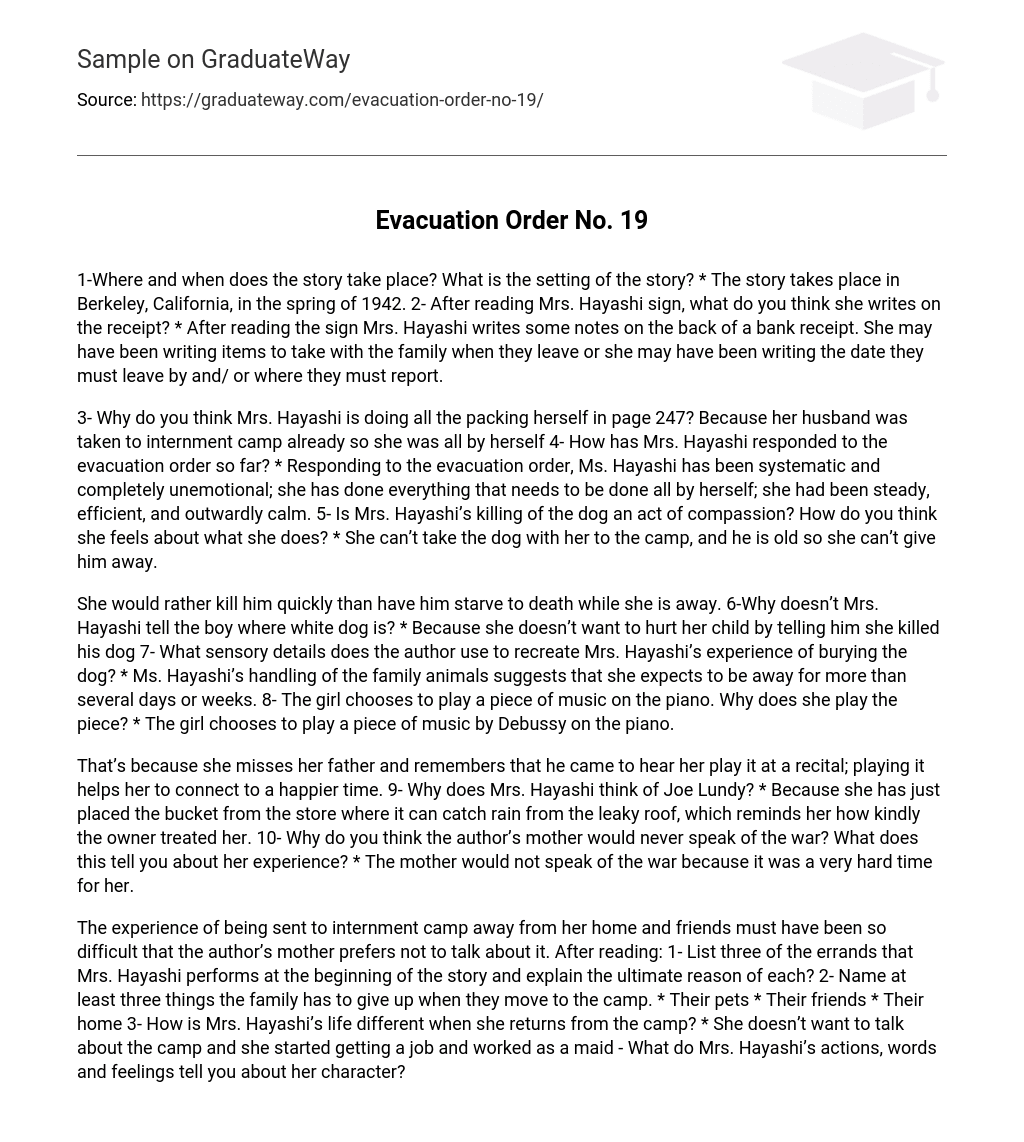1-Where and when does the story take place? What is the setting of the story? * The story takes place in Berkeley, California, in the spring of 1942. 2- After reading Mrs. Hayashi sign, what do you think she writes on the receipt? * After reading the sign Mrs. Hayashi writes some notes on the back of a bank receipt. She may have been writing items to take with the family when they leave or she may have been writing the date they must leave by and/ or where they must report.
3- Why do you think Mrs. Hayashi is doing all the packing herself in page 247? Because her husband was taken to internment camp already so she was all by herself 4- How has Mrs. Hayashi responded to the evacuation order so far? * Responding to the evacuation order, Ms. Hayashi has been systematic and completely unemotional; she has done everything that needs to be done all by herself; she had been steady, efficient, and outwardly calm. 5- Is Mrs. Hayashi’s killing of the dog an act of compassion? How do you think she feels about what she does? * She can’t take the dog with her to the camp, and he is old so she can’t give him away.
She would rather kill him quickly than have him starve to death while she is away. 6-Why doesn’t Mrs. Hayashi tell the boy where white dog is? * Because she doesn’t want to hurt her child by telling him she killed his dog 7- What sensory details does the author use to recreate Mrs. Hayashi’s experience of burying the dog? * Ms. Hayashi’s handling of the family animals suggests that she expects to be away for more than several days or weeks. 8- The girl chooses to play a piece of music on the piano. Why does she play the piece? * The girl chooses to play a piece of music by Debussy on the piano.
That’s because she misses her father and remembers that he came to hear her play it at a recital; playing it helps her to connect to a happier time. 9- Why does Mrs. Hayashi think of Joe Lundy? * Because she has just placed the bucket from the store where it can catch rain from the leaky roof, which reminds her how kindly the owner treated her. 10- Why do you think the author’s mother would never speak of the war? What does this tell you about her experience? * The mother would not speak of the war because it was a very hard time for her.
The experience of being sent to internment camp away from her home and friends must have been so difficult that the author’s mother prefers not to talk about it. After reading: 1- List three of the errands that Mrs. Hayashi performs at the beginning of the story and explain the ultimate reason of each? 2- Name at least three things the family has to give up when they move to the camp. * Their pets * Their friends * Their home 3- How is Mrs. Hayashi’s life different when she returns from the camp? * She doesn’t want to talk about the camp and she started getting a job and worked as a maid – What do Mrs. Hayashi’s actions, words and feelings tell you about her character? How does she change over the course of the story? Support your answer with justifications from the text * Ms. Hayashi’s actions reveal that she is independent but also realistic enough to know when circumstances require her obey to the rules.
5- Which of the story’s details correspond to the historical background provided on page 244? 6- Why aren’t the son and daughter ever identified? Because this is a third person limited narrative and the story is more about the narrator’s Grandma than the narrator’s mother and uncle – Can Mrs. Hayashi be thought of as a hero? Cite specific details from the story. No because she killed the dog, and let the parrot go and these were very important to her children 8- At the end of the story, the narrator identifies herself for the first time as Mrs. Hayashi’s granddaughter. How does this shift affect your response to the story? Are there details in the story that the narrator could not possibly have known? 9- Why is it ironic that the boy and the girl in the story have so many typical American interests? Because they are originally Japanese





